DisposeRX

(Illustrations by Cristina Spanò)
Leaving unused prescription drugs in your medicine cabinet can have dangerous — even deadly — consequences. But simply throwing them out or flushing them away is damaging to the environment, according to EPA studies. DisposeRX provides a convenient solution to this critical issue: a patented drug disposal powder that when mixed with warm water turns any prescription drug — whether pill, tablet, liquid, powder, or patch — into a biodegradable gel that can be tossed in the trash. Founded in part by Dennis Wiggins WG76, the company sells its powder packets through pharmacies and wholesale distributors and has donated them to more than 275 organizations to advance its mission of eradicating prescription-drug misuse.
Thespie
Theater stages across the globe have gone dark in the face of the coronavirus, and as a result, the performing arts industry faces incredible challenges to its survival. Thespie, a new site started by Tyler Stoops WG10, has taken a leading role in helping artists share and monetize their work in this landscape. Launched in May, the theater-discovery platform aggregates information on more than 1,000 digital performances, podcasts, songbooks, and more — and directs viewers to the platforms that host them, including Amazon, Spotify, and YouTube.
Misfits Market
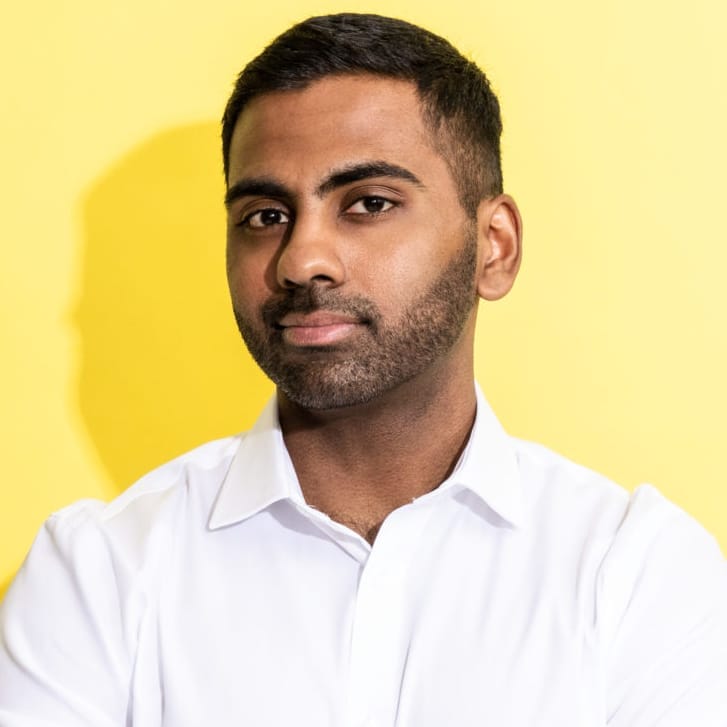
Abhi Ramesh C15 W15
Beauty is only skin-deep, but grocery stores constantly reject perfectly good produce if it’s blemished or misshapen or otherwise won’t look enticing on their shelves. That’s where Misfits Market comes in. Abhi Ramesh C15 W15 created the direct-to-consumer subscription service with the goal of developing a more sustainable grocery model. The company purchases “ugly” produce from organic farmers, sells it via subscription boxes for up to 40 percent less than store prices, and ships it in sustainable packaging. As the pandemic has increased demand, Misfits Market recently raised $85 million from investors to accelerate growth and reach more locations.
My Virtual Veterinarian
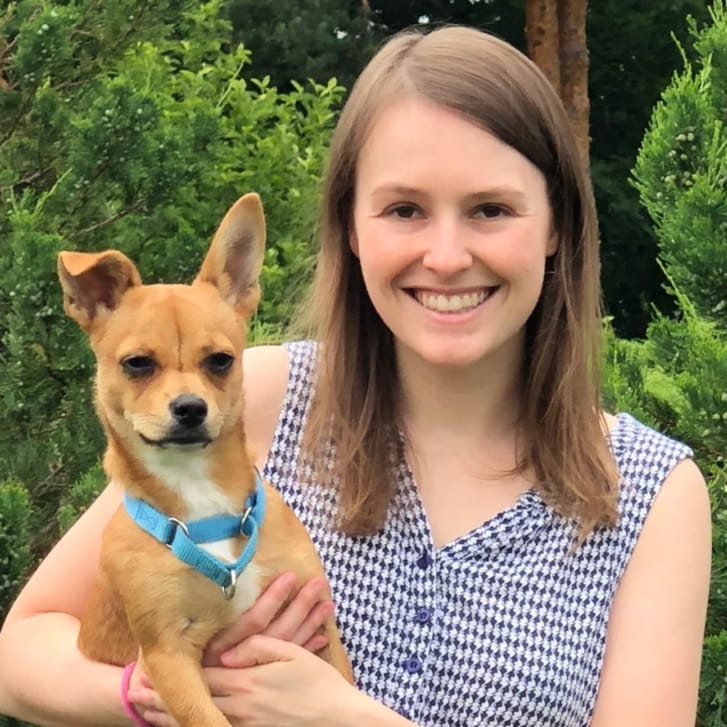
Felicity Johnson WG20
Caring for a sick or aging pet that needs regular veterinary visits can be challenging, as Felicity Johnson WG20 discovered when her cat was diagnosed with cancer. Her solution: creating My Virtual Veterinarian, which lets pet parents easily schedule telemedicine visits. In May, the concept won the Startup Challenge hosted by Penn Wharton Entrepreneurship (now known as Venture Lab), taking home $30,000 in prize money and $15,000 in support services. The winnings and other Venture Lab resources have helped to scale Johnson’s business at a time when its remote offerings have never been needed more. Since its launch in January 2019, My Virtual Veterinarian has also expanded its services to sell prescriptions, food, and supplements.
Olori
 Having grown up in Nigeria, where nearly three out of four girls are unable to obtain schooling, Tomide Awe WG17 knew she wanted to find a way to empower women in her home country while also celebrating her rich heritage. In her final year at Wharton, Awe worked to merge her Nigerian culture with a solution to education inequality though fashion. Olori — meaning “Queen” in the Yoruba language — partners with artisans and women-owned businesses in Africa to produce handmade bags and accessories crafted with traditional prints and colorful textiles. Each Olori product sold pays tuition for girls in under-resourced African communities.
Having grown up in Nigeria, where nearly three out of four girls are unable to obtain schooling, Tomide Awe WG17 knew she wanted to find a way to empower women in her home country while also celebrating her rich heritage. In her final year at Wharton, Awe worked to merge her Nigerian culture with a solution to education inequality though fashion. Olori — meaning “Queen” in the Yoruba language — partners with artisans and women-owned businesses in Africa to produce handmade bags and accessories crafted with traditional prints and colorful textiles. Each Olori product sold pays tuition for girls in under-resourced African communities.
Halo
 Here’s a very different kind of “mobile” advertising. Halo attaches LED screens atop cars — an idea with so much promise that the company was purchased by Lyft in February. After dreaming up the concept at Penn in 2018, founders Kenan Saleh W19, alumnus Faizan Bhatty, Ryanne Fadel W21, and Nabeel Farooqui ENG21 garnered funding and development support from organizations such as the University’s Weiss Tech House and Penn Wharton Entrepreneurship. Now, as a Lyft business, Halo offers drivers $100 per month to attach its monitors to their cars, where the screens display targeted ads based on location, time, and even weather — a modern-day advertising solution for a new ride-hailing era.
Here’s a very different kind of “mobile” advertising. Halo attaches LED screens atop cars — an idea with so much promise that the company was purchased by Lyft in February. After dreaming up the concept at Penn in 2018, founders Kenan Saleh W19, alumnus Faizan Bhatty, Ryanne Fadel W21, and Nabeel Farooqui ENG21 garnered funding and development support from organizations such as the University’s Weiss Tech House and Penn Wharton Entrepreneurship. Now, as a Lyft business, Halo offers drivers $100 per month to attach its monitors to their cars, where the screens display targeted ads based on location, time, and even weather — a modern-day advertising solution for a new ride-hailing era.
ConnectRship

Andy Nadel W83 and daughter Amy
With his newest venture, Andy Nadel W83 aims to make fostering business relationships in a remote world as fun as Friday game night. Nadel — who also founded corporate “swag” maker Pride Products more than two decades ago — launched ConnectRship this spring with his daughter, Amy, shortly after states across the U.S. went into lockdown. The company offers an alternative to in-person client meetings and team activities with Zoom-based events that are guided by a ConnectRship facilitator and filled with relationship-building games (think: memory challenges, word associations, and trivia). Depending on a company’s goals — whether fostering camaraderie among co-workers or getting to know customers better — ConnectRship customizes games for each session and can make themes specific to businesses, regions, industries, and more. To bring things full circle, companies can add their own personal touches by sending participants shirts, bottles, and other branded merchandise through Pride Products.
Rmdy
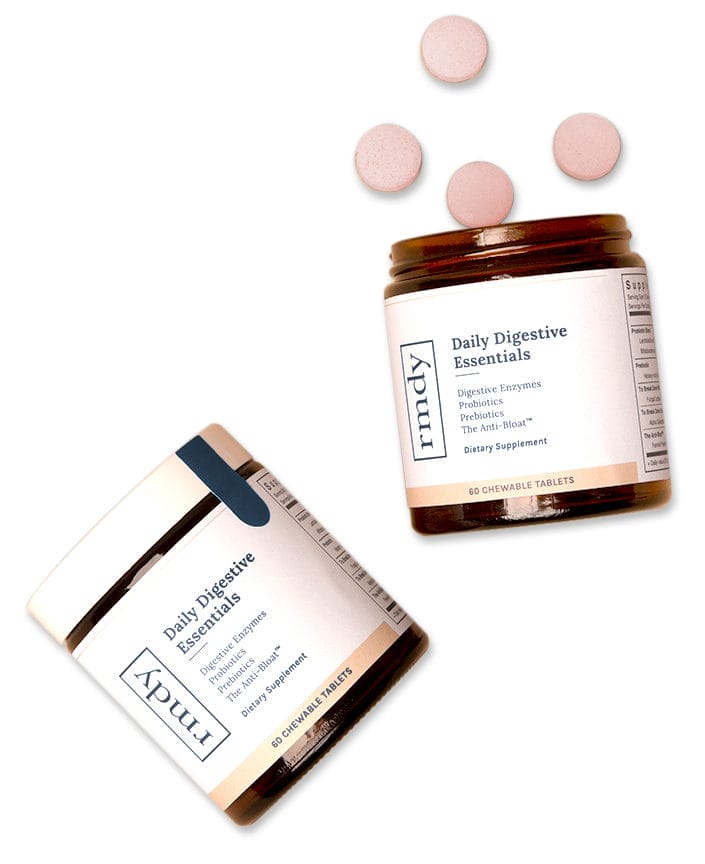 Nobody should have to worry about negative side effects caused by something as vital as everyday food. But for those struggling with digestive problems, Rmdy may be the answer. Founded by Ryan Morgan C11 W11 WG20 and Kate Kim WG20, the health and wellness startup offers chewable tablets that promote both short- and long-term gut health by improving digestion and reducing stomach discomfort. Morgan and Kim put science first in formulating their tablets by partnering with researchers, gastroenterologists, and medical school professors for their expertise. Each dose contains digestive enzymes, probiotics, prebiotics, and a proprietary Anti-Bloat blend — an herbal mix of ginger, fennel, and peppermint. Through daily use of Rmdy, the company aims to make issues such as bloating and gas things of the past.
Nobody should have to worry about negative side effects caused by something as vital as everyday food. But for those struggling with digestive problems, Rmdy may be the answer. Founded by Ryan Morgan C11 W11 WG20 and Kate Kim WG20, the health and wellness startup offers chewable tablets that promote both short- and long-term gut health by improving digestion and reducing stomach discomfort. Morgan and Kim put science first in formulating their tablets by partnering with researchers, gastroenterologists, and medical school professors for their expertise. Each dose contains digestive enzymes, probiotics, prebiotics, and a proprietary Anti-Bloat blend — an herbal mix of ginger, fennel, and peppermint. Through daily use of Rmdy, the company aims to make issues such as bloating and gas things of the past.
ConnectED Mobile
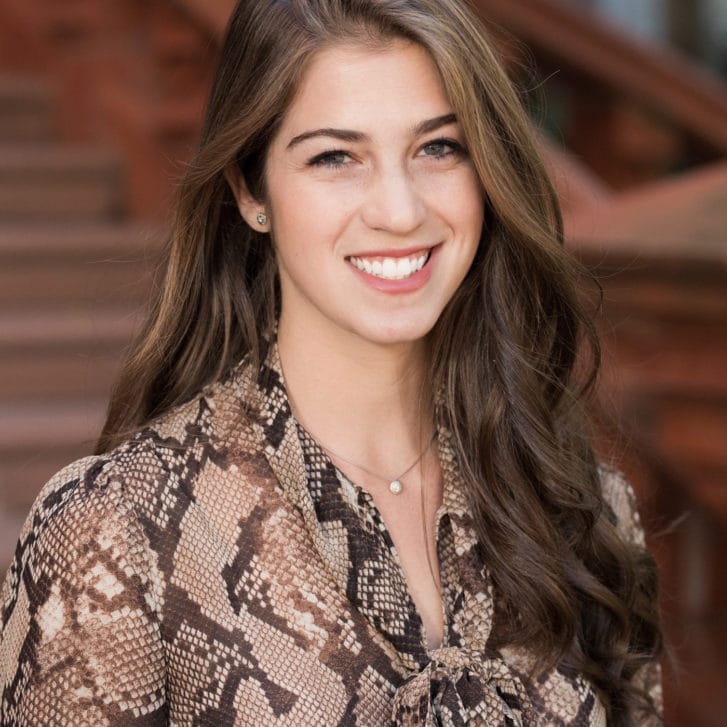
Andie Kaplan WG20
For international students in the U.S., finding an affordable phone plan can be daunting. Founded last year by Andie Kaplan WG20, ConnectED Mobile is changing the game by providing individual plans created specifically for these students. The company — which was selected for Venture Lab’s VIP-X program — offers service at more than 25 universities and has options starting at $23 a month. Its plans also have built-in perks for travelers, including the ability to use free data in hundreds of locations abroad. (In response to the COVID- 19 pandemic, ConnectED Mobile offered to freeze accounts for customers who weren’t returning stateside for the fall semester.)
This App Saves Lives
 Distracted driving results in 1.5 million accidents, 500,000 injuries, and more than 3,000 deaths each year. After experiencing a near-collision with a distracted driver, Ryan Frankel WG12 founded This App Saves Lives to incentivize safe driving practices. TASL detects when a car is moving at least 10 miles per hour and assigns “TASL points” to drivers who don’t interact with their phones during this time. The free app is gamified with rankings, badges, and competitions to make the platform more engaging. Through TASL’s partnerships with local and national brands, such as Shake Shack and Urban Outfitters, users can earn redeemable rewards for time spent driving undistracted. Schools, organizations, and employers can also sponsor challenges and create communities.
Distracted driving results in 1.5 million accidents, 500,000 injuries, and more than 3,000 deaths each year. After experiencing a near-collision with a distracted driver, Ryan Frankel WG12 founded This App Saves Lives to incentivize safe driving practices. TASL detects when a car is moving at least 10 miles per hour and assigns “TASL points” to drivers who don’t interact with their phones during this time. The free app is gamified with rankings, badges, and competitions to make the platform more engaging. Through TASL’s partnerships with local and national brands, such as Shake Shack and Urban Outfitters, users can earn redeemable rewards for time spent driving undistracted. Schools, organizations, and employers can also sponsor challenges and create communities.
Minibar Delivery
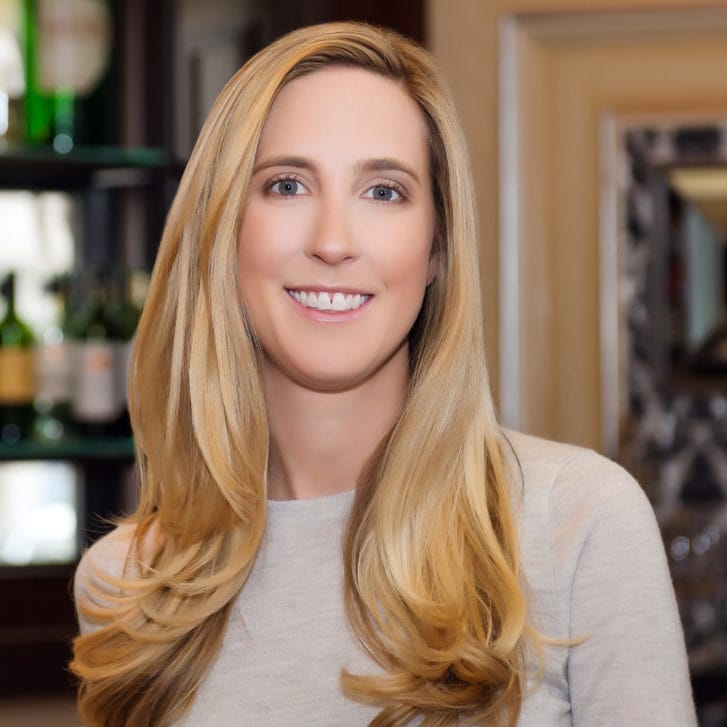
Lindsey Andrews WG09
At the onset of the pandemic in the U.S., online alcohol sales skyrocketed 234 percent from the same time last spring. Understanding the appeal of home-delivery service well ahead of statewide lockdowns, Lindsey Andrews WG09 and Lara Crystal WG09 launched Minibar Delivery in 2014. It all started when Andrews and Crystal, out of wine on a takeout Tuesday night, wanted an easier way to score a bottle than heading to the nearest New York City shop. Now relying on those mom-and-pop stores as suppliers, Minibar Delivery is making folks at home happy while, critically, supporting small businesses.
Young Alfred
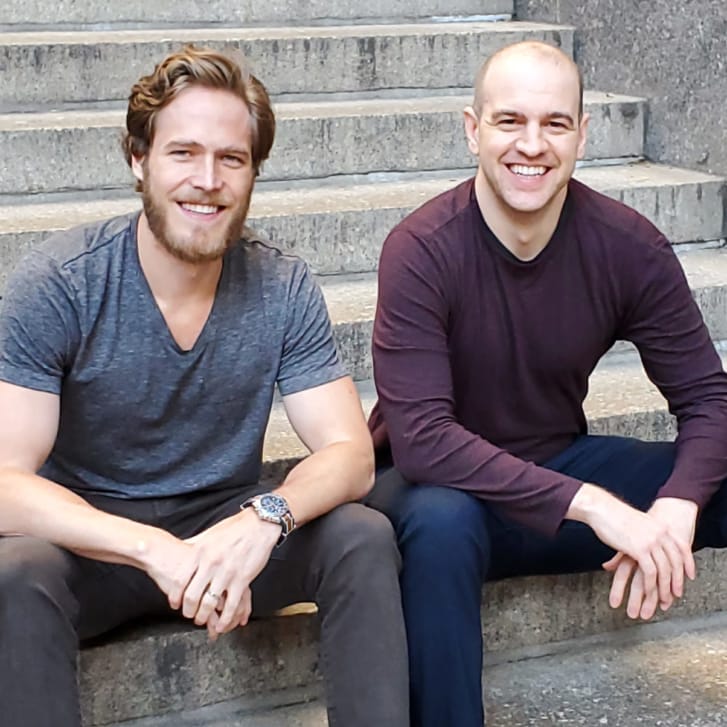
David Stasie WG17 and Jason Christiansen WG17
The story of Young Alfred started at Wharton: It’s where founders Jason Christiansen WG17 and David Stasie WG17 met and later launched their home-insurance shopping platform to give customers more transparency into their coverage options. Leveraging more than a billion data points, the platform matches users to policies from a range of approved carriers and delivers rate comparisons to users’ inboxes in minutes. Just a few years after its launch, the company has caught the eye of major investors, including Google, which late last year led a $10 million funding round for Young Alfred through its artificial intelligence focused venture fund, Gradient Ventures.
Elix

Lulu Ge WG19
Lulu Ge WG19 is on a mission to democratize access to holistic herbal remedies for women’s health with her company, Elix. Its flagship product, Cycle Balance, tailors medicinal herbs to a customer’s menstrual symptoms through a proprietary online assessment. Subscribers additionally receive personalized care through monthly check-ins and resources compiled by the team’s on-call experts. Elix also recently released its Immunity Duo line, which utilizes anti-inflammatory and antioxidant ingredients to strengthen immune response. Ge originally drafted the business plan for Elix, at that time called #periodpainfree, in class with Wharton professor Ethan Mollick. The company, an alum of Wharton’s VIP-X accelerator, was a finalist in the Startup Challenge and received the Launch Award within the Penn Wharton Innovation Fund.
Stringr
 It’s a familiar story these days: News outlets of all sizes are struggling to maintain quality reporting as they grapple with declining ad revenue and ongoing staff cuts. Now, they don’t have to sacrifice critical coverage, even on a shoestring budget. Video-sharing platform Stringr is connecting news sources with freelance videographers for on-the-ground footage, enabling anyone with a smartphone to respond to requests for coverage and film broadcast-quality recordings. The company is the brainchild of former news producer Lindsay Stewart WG14 and consultant/product manager Brian McNeill WG14, who met at Wharton as Executive MBAs. Since its founding in 2014, the company has grown its network to more than 100,000 videographers and has attracted investment from big-name brands such as Thomson Reuters and the Associated Press.
It’s a familiar story these days: News outlets of all sizes are struggling to maintain quality reporting as they grapple with declining ad revenue and ongoing staff cuts. Now, they don’t have to sacrifice critical coverage, even on a shoestring budget. Video-sharing platform Stringr is connecting news sources with freelance videographers for on-the-ground footage, enabling anyone with a smartphone to respond to requests for coverage and film broadcast-quality recordings. The company is the brainchild of former news producer Lindsay Stewart WG14 and consultant/product manager Brian McNeill WG14, who met at Wharton as Executive MBAs. Since its founding in 2014, the company has grown its network to more than 100,000 videographers and has attracted investment from big-name brands such as Thomson Reuters and the Associated Press.
Published as “Peculiar Produce, Virtual Pet Care, and a Life-Saving App” in the Fall/Winter 2020 issue of Wharton Magazine.
Read about other alumni-powered ventures in the full Watchlist.
This article was updated on December 10, 2020.
























